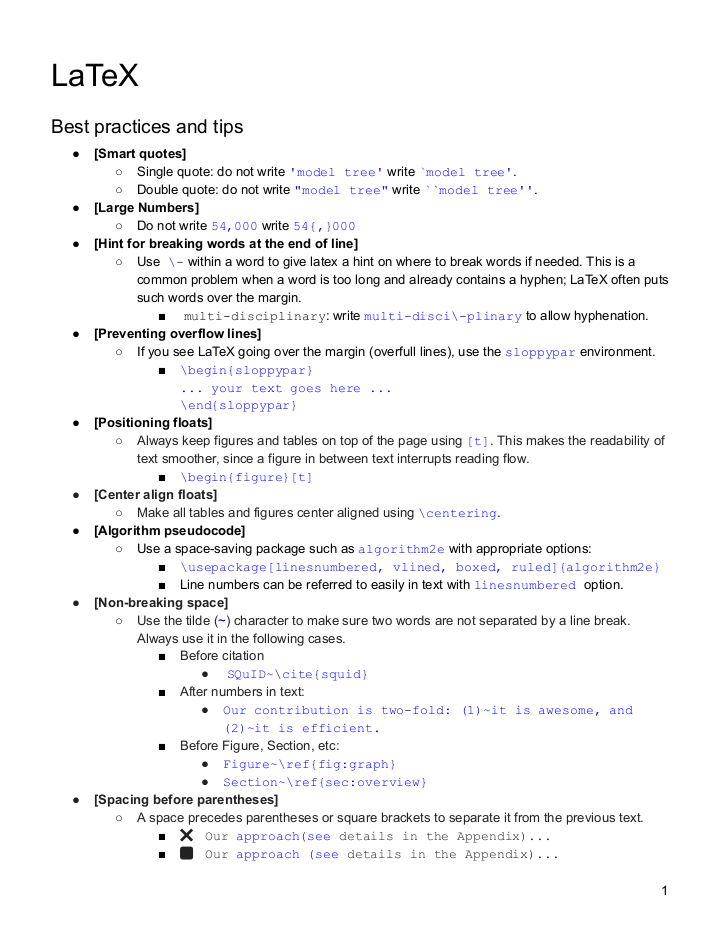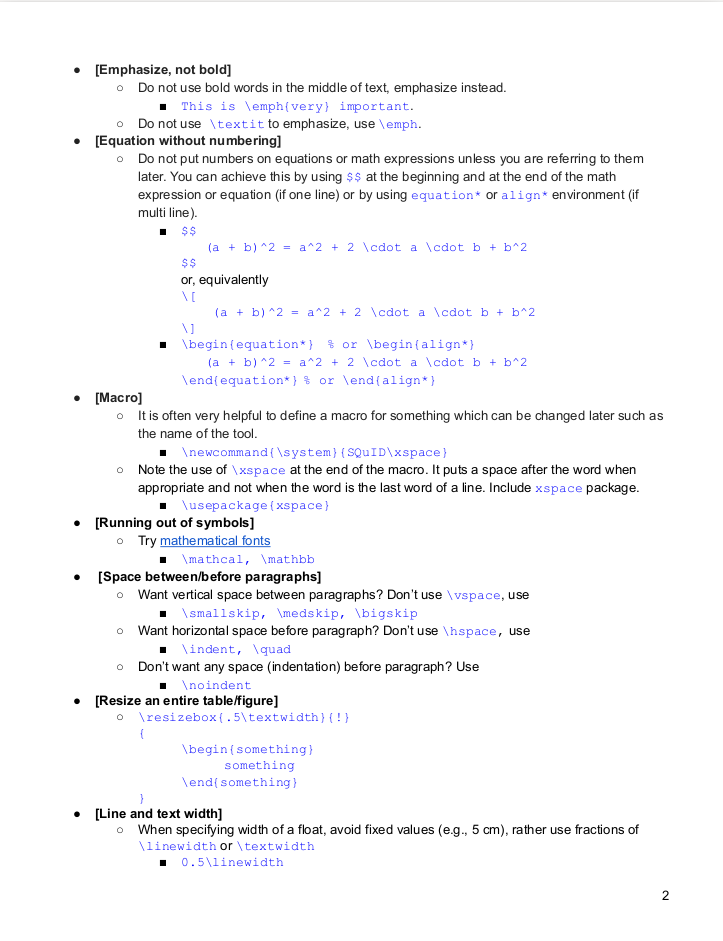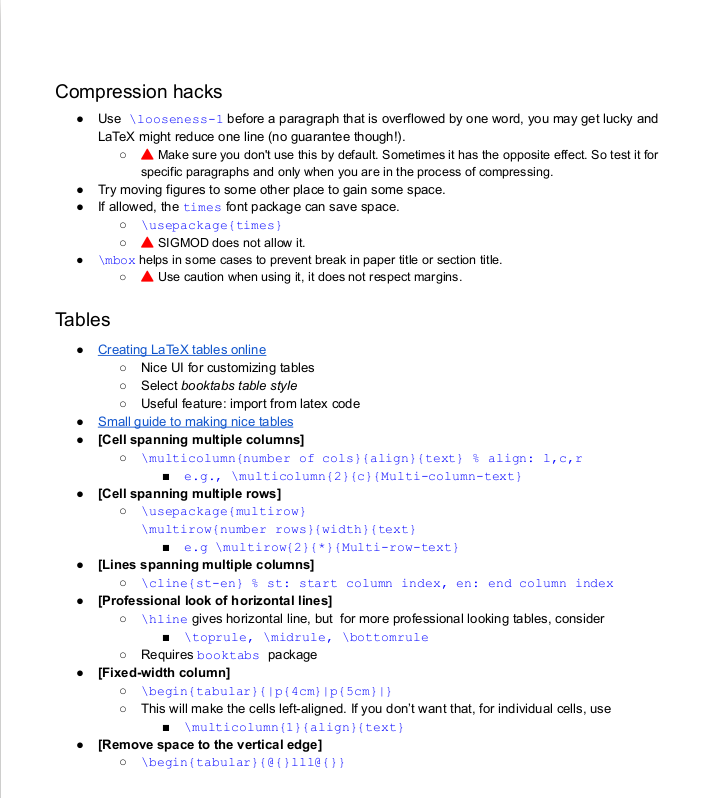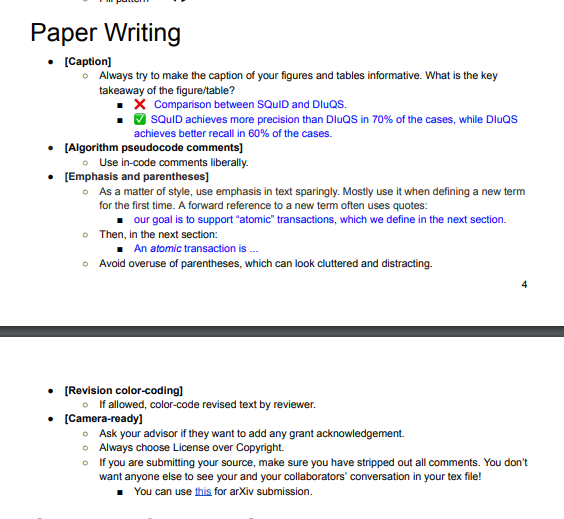LaTeX best practices and compression
EDIT: this is becoming a more generic thingy for everything I’d ever need to refer to when writing a paper, TODO clean this at some point.
Resources – DREAM Lab links to https://dream.cs.umass.edu/wp-content/uploads/2020/04/Tips-and-Best-Practices.pdf. Until I set up a system to save PDF info, I’ll paste it as screenshots here:



ChatGPT summarized the relevant pages of the PDF file thus, but didn’t do it well, mostly rewriting myself:
General Formatting
- Smart Quotes: Use `x’ and ``x’’ for single and double quotes respectively.
- Large Numbers: Write large numbers as 54{,}000.
- Word Breaking: Use - to suggest hyphenation points in long words, including ones that already have hyphens inside them. Such words are likely to go over margins etc.:
multi-discipli\-nary - Overflow Lines:
\begin{sloppypar}...for paragraphs where latex goes over the margin. - Float Positioning: Place figures and tables at the top of the page for readability:
\begin{figure}[t] - Center Align Floats: Use
\centeringfor aligning tables and figures.
Specific Elements
- Non-Breaking Space: Use the tilde (~) to keep words together, including always
- before citations:
sth~\cite{whatever} - after numbers in text
- before figure/section references
- before citations:
- Emphasize vs. Bold: Prefer
\emphover bold or\textit.
Equations and Macros
- Macros: Create macros for things that will be changed later, such as DATASET NAMES.
\newcommand{\system}{SQuID\xspace}\xspacehere adds as space unless end of sentence. Package\usepackage{xspace}
Spacing and Sizing
- Paragraph Spacing: Use
\smallskip,\medskip, and\bigskip, instead of\vspace - Line and Text Width: Use fractions of
\linewidthor\textwidth. - Resizing Tables/Figures: Use
\resizeboxwith appropriate dimensions.
Compression hacks
- (see pictures)
- Make spaces smaller around lists:
\begin{itemize}
\setlength{\itemsep}{0pt}
\setlength{\parskip}{0pt}
Paper writing hacks

Even more
Non-breaking spaces
best practices - When should I use non-breaking space? - TeX - LaTeX Stack Exchange lists ALL the places where Knuth wanted people to put nonbreaking spaces, incl:
1)~one 2)~twoDonald~E. Knuth1,~2Chapter~12
Less obvious and not from him:
I~am
Also:
- before all cites, refs
- … and inlined equations
Citations
- ChatGPT says that citations should come before footnotes to prioritize the scholarly source over unimportant info.
- Citations go before the last period of the sentence. EDIT: NOT PARENTHESES, THEY SHOULD BE WITHIN PARENTHESES.4 DAMN
Other bits
- I sometimes write
and around ~50%forgetting that~is a nbsp — hard to catch when reading the text. - As when writing code I like to add some
assert False(or a failing test) so that I know where I stopped the last time,\latexstopcompiling hereis a neat way to make sure I REALLY finis ha certain line I started but not finished.
Nel mezzo del deserto posso dire tutto quello che voglio.
comments powered by Disqus